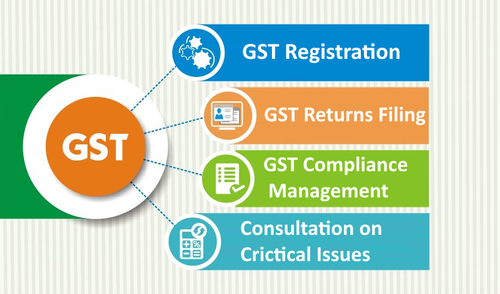Professional Tips for Selecting the most effective GST Registration Services in Singapore
Wiki Article
From Begin to End Up: The Ultimate Roadmap to GST Registration for Organizations Seeking Financial Security
Navigating the complexities of Goods and Solutions Tax Obligation (GST) enrollment is an essential step for services making every effort for economic security. Damaging down the roadmap into manageable actions can simplify the enrollment trip for businesses looking to enhance their financial standing.Understanding GST Basics
Digging into the fundamental concepts of Item and Services Tax Obligation (GST) is crucial for obtaining a detailed understanding of its implications on services and the economic situation. GST is a value-added tax obligation levied on the majority of products and services for residential usage. It has replaced numerous indirect taxes that existed in the pre-GST era, streamlining the tax obligation framework and improving simplicity of doing service in India. Under the GST system, both products and solutions are strained at a certain rate, which is identified based on their classification. If their annual turn over goes beyond the threshold limitation set by the federal government, companies are needed to register for GST. Input Tax Credit (ITC) is a substantial feature of GST, allowing organizations to declare credit rating for taxes paid on inputs, reducing the overall tax problem. Recognizing the fundamentals of GST is essential for businesses to adhere to tax regulations, manage their financial resources efficiently, and contribute to the nation's financial development by joining a clear tax obligation system.Qualification Standards for Enrollment
To sign up for GST, services should meet specific eligibility criteria developed by the government. The main qualification requirement is that any kind of service included in the supply of products or solutions with an annual accumulation turn over above the threshold restriction established by the authorities need to register for GST. As of the existing guidelines, the threshold limitation for GST registration is an annual aggregate turn over of 40 lakhs for companies operating within a state, besides special category states where the limit is 20 lakhs. Furthermore, specific businesses are called for to sign up for GST regardless of their turnover, such as interstate vendors, casual taxed individuals, and services accountable to pay tax under the reverse cost system. It is vital for organizations to extensively evaluate their turn over and deal types to determine their GST enrollment responsibilities properly. Failure to sign up for GST when eligible can result in charges and legal consequences, making it vital for services to abide by the defined qualification criteria.Records Needed for Registration
Having satisfied the eligibility requirements for GST registration, services need to currently ensure they have the requisite files in location to wage the registration procedure successfully. The records needed for GST enrollment commonly include proof of service constitution, such as collaboration deed, registration certification, or incorporation certification for various kinds of organizations. Additionally, organizations require to give documents developing the primary location of organization, such as a rental arrangement or electricity costs. Frying pan card of business, in addition to the identity and address evidence of promoters/partners/directors, are essential for confirmation functions. Financial institution account statements, together with canceled cheques or a copy of the bank passbook, are called for to validate the economic information supplied during enrollment. Companies should have electronic trademarks prepared for the authorized signature. Making sure all these documents are he said organized and conveniently offered will expedite the GST registration process, allowing companies to adhere to tax obligation regulations perfectly.Step-by-Step Enrollment Refine
Commencing the GST enrollment process involves a collection of structured actions to make certain a certified and seamless registration for businesses. The initial step is to go to the GST portal and submit the registration kind with accurate details of business entity. Following this, the candidate obtains a Momentary Recommendation Number (TRN) which is used to resume the application process if it's not completed in one go.Following, all called for files according to the list provided by the GST portal need to be submitted. These documents generally include evidence of service address, identification and enrollment proofs of marketers, financial statements, and service entity's PAN card.

Post-Registration Compliance Standards

Conclusion
In final thought, businesses seeking financial security has to understand the essentials of GST, fulfill qualification requirements, gather essential records, adhere to the step-by-step registration procedure, and comply with post-registration guidelines - Best GST registration services in Singapore. By sticking to these actions, businesses can ensure conformity with tax obligation policies and maintain economic stability in the long runFurthermore, certain organizations are needed to register for GST regardless of their turn over, such as interstate providers, casual taxed persons, and businesses liable to pay tax obligation under the reverse charge device.Having fulfilled the eligibility standards for GST registration, organizations need to currently guarantee they have the requisite records in area to continue with the enrollment process successfully. The papers needed for GST registration typically consist of proof of service constitution, such as partnership act, enrollment certification, or unification certificate for various kinds of businesses. In addition, businesses require to provide papers establishing the major place of service, such as a rental agreement or electrical energy bill.Starting the GST registration process entails a collection of structured steps to make sure a compliant and smooth enrollment for services.
Report this wiki page